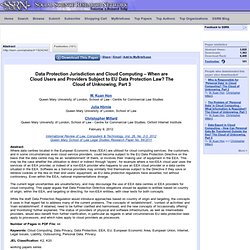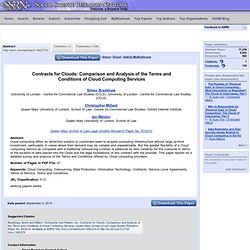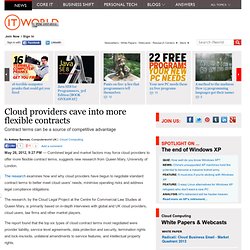

Data Protection Jurisdiction and Cloud Computing – When are Cloud Users and Providers Subject to EU Data Protection Law? The Cloud of Unknowing, Part 3 by W. Kuan Hon, Julia Hörnle, Christopher Millard. W.

Kuan Hon Queen Mary University of London, School of Law - Centre for Commercial Law Studies Julia Hörnle Queen Mary University of London, School of Law Christopher Millard Queen Mary University of London, School of Law - Centre for Commercial Law Studies; Oxford Internet InstituteFebruary 9, 2012 International Review of Law, Computers & Technology, Vol. 26, No. 2-3, 2012 Queen Mary School of Law Legal Studies Research Paper No. 84/2011 Abstract: Where data centres located in the European Economic Area ('EEA') are utilised for cloud computing services, the customers, and in some circumstances even cloud service providers, could become subject to the EU Data Protection Directive on the basis that the data centre may be an ‘establishment’ of theirs, or involves their ‘making use’ of equipment in the EEA.
The current legal uncertainties are unsatisfactory, and may discourage the use of EEA data centres or EEA providers for cloud computing. Number of Pages in PDF File: 44 working papers series. Contracts for Clouds: Comparison and Analysis of the Terms and Conditions of Cloud Computing Services by Simon Bradshaw, Christopher Millard, Ian Walden.
Simon Bradshaw University of London - Centre for Commercial Law Studies (CCLS); University of London - Centre for Commercial Law Studies (CCLS) Christopher Millard Queen Mary University of London, School of Law - Centre for Commercial Law Studies; Oxford Internet Institute Ian Walden Queen Mary University of London, School of Law Queen Mary School of Law Legal Studies Research Paper No. 63/2010 Abstract: Cloud computing offers an attractive solution to customers keen to acquire computing infrastructure without large up-front investment, particularly in cases where their demand may be variable and unpredictable.

Number of Pages in PDF File: 47 Keywords: Cloud Computing, Outsourcing, Data Protection, Information Technology, Contracts, Service Level Agreements, Terms of Service, Terms and Conditions JEL Classification: K12 working papers series Suggested Citation. Cloud providers cave into more flexible contracts. May 28, 2012, 9:27 PM — Combined legal and market factors may force cloud providers to offer more flexible contract terms, suggests new research from Queen Mary, University of London.

The research examines how and why cloud providers have begun to negotiate standard contract terms to better meet cloud users' needs, minimise operating risks and address legal compliance obligations. The research, by the Cloud Legal Project at the Centre for Commercial Law Studies at Queen Mary, is primarily based on in-depth interviews with global and UK cloud providers, cloud users, law firms and other market players. The report found that the top six types of cloud contract terms most negotiated were provider liability, service level agreements, data protection and security, termination rights and lock-ins/exits, unilateral amendments to service features, and intellectual property rights. According to the research there are signs of market development though.
Systems, Eversheds, Turbulence in the cloud? Research shows businesses are unaware of ”unfair” terms in cloud contracts - Legal Week Law. QMUL Cloud Legal Project, Queen Mary, University of London.